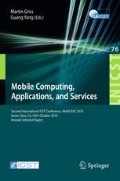Abstract
In this paper we present our initial work on a mobile phone application for assisting stroke rehabilitation. We believe that using a mobile phone to administer and track stroke rehabilitation is novel. We call our system Dr. Droid and focus on the automated scoring of motions performed by patients being administered the Wolf Motor Function Test (WMFT) by placing a smart phone in a holster at the patients wrist. We have developed a complete software application that administers the test by giving audio and visual instructions. We collect a motion trace by sampling the 3-axis accelerometer available on the phone. We double-integrate the acceleration data and apply a novel reorientation algorithm to correct for mis-alignment of the accelerometer. Using dynamic time warping and hidden Markov models we assign an objective, quantitative score to the patient’s exercises. We validate our method by performing experiments designed to simulate the motions of a stroke patient.
Access this chapter
Tax calculation will be finalised at checkout
Purchases are for personal use only
Preview
Unable to display preview. Download preview PDF.
References
Wolf motor function test, youtube video, http://www.youtube.com/watch?v=SlJk88Nd-ZM
Assessing wolf motor function test as outcome measure for research in patients after stroke. Stroke 32(7), 1635–1639 (2001)
Bishop, C.M.: Pattern Recognition and Machine Learning (Information Science and Statistics). Springer-Verlag New York, Inc., Secaucus (2006)
Wade, E., Parnandi, A., Mataric, M.: Automated administration of the automated administration of the wolf motor function test for post-stroke assessment. In: ICST 4th International ICST Conference on Pervasive Computing Technologies for Healthcare 2010 (2010)
Ellis, D.: Dynamic time warp in matlab, http://www.ee.columbia.edu/~dpwe/resources/matlab/dtw/
Elmezain, M., et al.: A hidden markov model-based continuous gesture recognition system for hand motion trajectory. In: ICPR, pp. 1–4 (2008)
Morris, D.M., et al.: The reliability of the wolf motor function test for assessing upper extremity function after stroke. Archives of Physical Medicine and Rehabilitation 82(6), 750–755 (2001)
Prashanth, M., et al.: Nericell: rich monitoring of road and traffic conditions using mobile smartphones. In: SenSys 2008: Proceedings of the 6th ACM Conference on Embedded Network Sensor Systems, pp. 323–336. ACM, New York (2008)
Wolf, S.L., et al.: Forced use of hemiplegic upper extremities to reverse the effect of learned nonuse among chronic stroke and head-injured patients. Experimental Neurology 104(2), 125–132 (1989)
Fasoli, S.E., Krebs, H.I., Stein, J., Frontera, W.R., Hogan, N.: Effects of robotic therapy on motor impairment and recovery in chronic stroke. Archives of Physical Medicine and Rehabilitation 84(4), 477–482 (2003)
Liu, J., Wang, Z., Zhong, L., Wickramasuriya, J., Vasudevan, V.: uwave: Accelerometer-based personalized gesture recognition and its applications. In: IEEE International Conference on Pervasive Computing and Communications, pp. 1–9 (2009)
Lloyd-Jones, D., Adams, R.J., Brown, T.M., et al.: Heart Disease and Stroke Statistics–2010 Update: A Report From the American Heart Association. Circulation 121(7), 46–215 (2010)
Lo, A.C., Guarino, P.D., Richards, L.G., et al.: Robot-Assisted Therapy for Long-Term Upper-Limb Impairment after Stroke. N. Engl. J. Med. 362(19), 1772–1783 (2010)
Lum, P.S., Taub, E., Schwandt, D., Postman, M., Hardin, P., Uswatte, G.: Automated constraint-induced therapy extension (autocite) for movement deficits after stroke. J. Rehabil. Res. Dev. 41(3A), 249–258 (2004)
Prekopcsak, Z.: Accelerometer based real-time gesture recognition. Poster Preview (2008)
Pylvänäinen, T.: Accelerometer Based Gesture Recognition Using Continuous HMMs. In: Marques, J.S., Pérez de la Blanca, N., Pina, P. (eds.) IbPRIA 2005. LNCS, vol. 3522, pp. 639–646. Springer, Heidelberg (2005)
Wilson, A., Shafer, S.: XWand: UI for intelligent spaces. In: CHI 2003: Proceedings of the SIGCHI Conference on Human Factors in Computing Systems, pp. 545–552. ACM, New York (2003)
Author information
Authors and Affiliations
Editor information
Editors and Affiliations
Rights and permissions
Copyright information
© 2012 ICST Institute for Computer Science, Social Informatics and Telecommunications Engineering
About this paper
Cite this paper
Goodney, A., Jung, J., Needham, S., Poduri, S. (2012). Dr. Droid: Assisting Stroke Rehabilitation Using Mobile Phones. In: Gris, M., Yang, G. (eds) Mobile Computing, Applications, and Services. MobiCASE 2010. Lecture Notes of the Institute for Computer Sciences, Social Informatics and Telecommunications Engineering, vol 76. Springer, Berlin, Heidelberg. https://doi.org/10.1007/978-3-642-29336-8_13
Download citation
DOI: https://doi.org/10.1007/978-3-642-29336-8_13
Publisher Name: Springer, Berlin, Heidelberg
Print ISBN: 978-3-642-29335-1
Online ISBN: 978-3-642-29336-8
eBook Packages: Computer ScienceComputer Science (R0)

